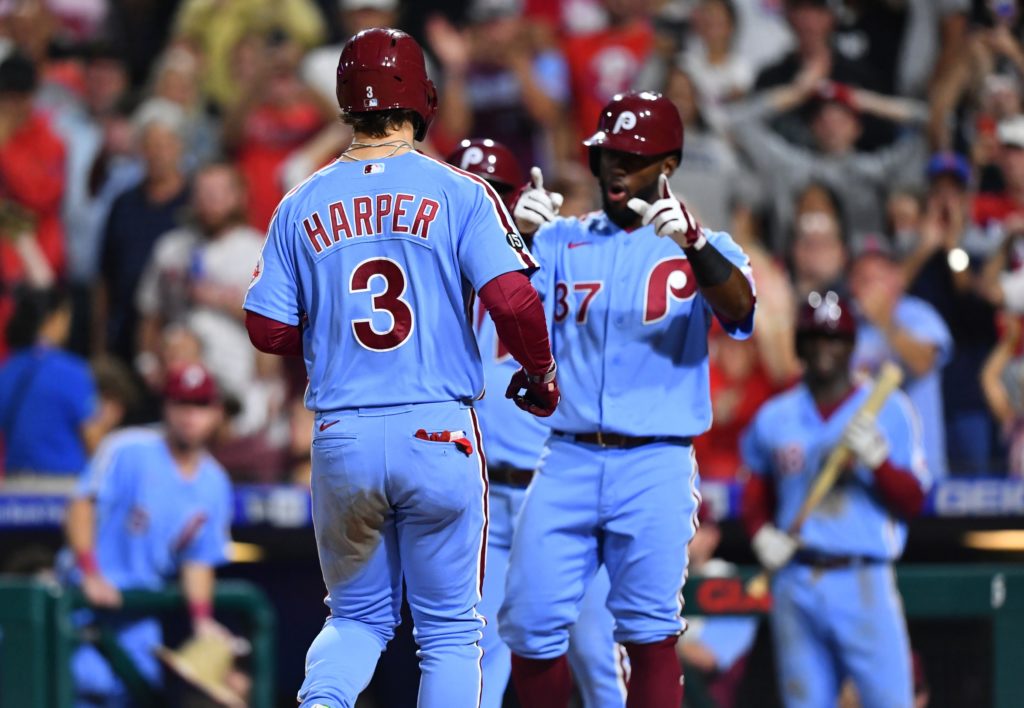Ad Disclosure
Hard to Watch These Phillies and Not Think “If Only”
By Bob Wankel
Published:

The Phillies erased an early touchdown deficit with a 17-run outburst en route to securing a series victory over the Cubs last night.
They remain very much mathematically in the middle of things as they wake up this morning just 2.5 games out of a postseason spot.
They will spend the next 10 days playing three teams that are a combined 93 games under .500. They have Bryce Harper, owner of a preposterous 1.055 OPS, who should be the National League MVP.
Maybe the Phillies’ latest win gave you one last jolt of hope. As for me, well, I remain unmoved this morning — I shoveled the last lump of dirt on my belief in this team earlier in the week. Two wins over a bad Cubs team won’t change that.
But, I couldn’t help but watch the Phillies’ furious — and impressive — rally last night and not think “if only.”
On a general level:
- If only Rhys Hoskins had stayed on the field.
- If only the Phillies had a better option this season for the 202 2/3 innings taken down by the ineffective trio of Matt Moore, Chase Anderson, and Vince Velasquez.
- If only a bad bullpen could have shaved even just a handful of blown saves off its mind-numbing total.
Honestly, hell, you could even excuse every transgression this team committed, of which there were plenty, through as recently as last Wednesday.
If only the Phillies had gone a reasonable 3-2 instead of 1-4 against two awful road teams at the start of their most recent homestand, they would be heading to Queens today with a chance to end the night tied for a division lead or in sole possession of a wild card spot.
As you know, both squandered opportunities and mistakes often prompt wondering “if only.” Whenever something bad happens, it’s only natural to think like this. And while lamenting the path that brings about a negative outcome is often futile once the result is permanent, there are situations in which such reflection can be useful when performed by the right people.
John Middleton & Friends, what’s up?
You have to wonder if the Phillies’ power players, the key decision-makers, are saying “if only” to themselves today– even as they maintain hope as their team hangs on by a thread in this playoff race.
Perhaps the organization will commit to better processes that ensure a comical lack of depth won’t sink it again moving forward. Maybe it will elect to spend beyond the competitive balance tax to ensure it doesn’t waste a season for the ages by a player that was supposed to represent more than just a bright spot in yet another likely October of darkness at Citizens Bank Park.
There’s no way to watch the Phillies and not conclude that this team, at several levels, has made a number of mistakes, many of which have been well-documented in recent years.
Mistakes often lead to one of two outcomes.
Mistakes can motivate, propel change, and in the absolute best-case scenario, prompt honest assessments and critical self-evaluations.
Alternatively, mistakes can expose a lack of self-awareness and an inability to accurately diagnose how failures happen in the first place. That’s how you end up flying around the country after a season in attempt to diagnose why a $160 million investment failed to pay off. And that’s also how you end up doing the most convenient thing, like, say, firing a manager who two years later would take an afterthought in a stacked division and turn it into what will soon be a 100-win team.
That result was certainly not born from honest self-evaluations regarding much deeper issues.
If you’re reading this, you probably care about the Phillies. Presumably, you’re a frustrated fan. Those missed opportunities and “if only” thoughts that have been running through your head about this team? Well, I have bad news — you can’t do anything about any of it.
That said, if the Phillies ownership group and key decision-makers are having similar thoughts this morning, perhaps there is hope that next year will finally be different.
Bob Wankel covers the Phillies for Crossing Broad. He is also the Vice President of Sports Betting Content at SportRadar. On Twitter: @Bob_Wankel E-mail: b.wankel@sportradar.com